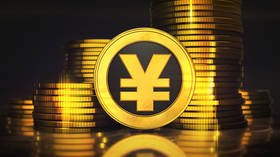China to launch digital yuan next year to replace cash

The People’s Bank of China has revealed plans to have its sovereign digital currency ready in time for the 2022 Winter Olympics. The announcement comes as the Covid-19 pandemic has accelerated a shift away from paper money.
Limited trials are already underway in Shenzhen, Suzhou, Chengdu and the Xiongan New Area in the northern province of Hebei, said the central bank’s governor Yi Gang. He told reporters that China’s government plans to run pilot tests at Olympic venues, though there remains no official timetable for a release.
An unnamed member of the State Council with knowledge of the project told the Nikkei Asia Review that If the government is satisfied with the results of this year's tests, the currency “will be issued next year.” Otherwise, “more tests will be conducted next year,” he said.
Also on rt.com China’s digital yuan will displace US dollar’s hegemony & bitcoin will join race, investor tells RT’s Keiser ReportThe digital yuan will be linked to the holder's smartphone number, with transactions taking place through an app. Users will be able to transfer money between accounts by tapping phones, much like having physical cash change hands. The currency will be legal tender, so it could be exchanged without needing a bank as an intermediary.
The size of transactions would be limited based on identity verification. A phone number alone would permit only small transactions, while providing proof of identity or a photo of a debit card would raise the limit. Speaking with a bank representative in person could allow for the cap to be removed entirely. Suspected criminal activity will be uncovered via transaction histories.
According to Eddie Yue, chief executive of the Hong Kong Monetary Authority, it has become easier to use and popularize new payment technologies since growing coronavirus concerns make consumers prefer digital currencies to physical cash.
For more stories on economy & finance visit RT's business section















